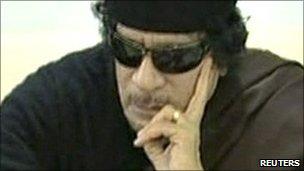Libya: Muammar Gaddafi subject to ICC arrest warrant
- Published

The International Criminal Court has issued an arrest warrant for Libyan leader Col Muammar Gaddafi, accusing him of crimes against humanity.
The court had grounds to believe he had ordered attacks on civilians during Libya's four-month uprising, it said.
The Hague-based court also issued warrants for two of Col Gaddafi's top aides - his son Saif al-Islam and intelligence chief Abdullah al-Sanussi.
Thousands of people are believed to have been killed in the conflict.
Anti-Gaddafi forces said on Monday they had launched a new push towards Tripoli, with heavy fighting near the strategic town of Bir al-Ghanam, to the south-west of capital.
The rebel defence minister told the BBC that forces opposed to Col Gaddafi may also make a move on the capital from the east.
'Unquestioned control'
The ICC arrest warrants refer to early weeks of the uprising, from 15 February until "at least 28 February".
The statement, read out by presiding judge Sanji Monageng, said there were "reasonable grounds to believe" that the three men were "criminally responsible" for the murder and persecution of civilians.
As the "recognised and undisputed leader of Libya", said the arrest warrant for Col Gaddafi, he had "absolute, ultimate and unquestioned control" over the state.
He introduced a state policy "aimed at deterring and quelling by any means, including by the use of force, the demonstrations of civilians against the regime", the court alleged.
The warrant says that while Saif al-Islam Gaddafi holds no official position in Libya, he is "the most influential person" in Col Gaddafi's inner circle.
Mr Sanussi, said the court, had "indirectly instructed the troops to attack civilians demonstrating" in Benghazi, the city that has become the rebels' stronghold.
The BBC's Andrew Harding in Misrata said there was celebratory gunfire on the streets of the besieged city as the news emerged.
"We are extremely happy that the whole world has united in prosecuting Gaddafi for the crimes he has committed," rebel council spokesman Jalal al-Galal told Reuters news agency from the rebel stronghold Benghazi. "The people feel vindicated by such a response."
On the military front, meanwhile, the rebels have advanced some six miles (10km) towards Tripoli in the past 24 hours, says the BBC's Mark Doyle on the front line about 40 miles south-west of the capital.
The fighting is taking place on a plain of rock and sand between Bir al-Ghanem and Bir Ayyad a few miles to the south, with shells whistling overhead in both directions and plumes of smoke and sand rising into the air, he says.
The rebels seem better armed in this strategic area than elsewhere in the country, adds our correspondent, who saw several pick-up trucks full of rebel soldiers - in clean uniforms and new-looking rocket launchers and rifles - heading for the front line.
'No legitimacy'
The warrants had been requested by chief ICC prosecutor Luis Moreno-Ocampo in May. He has said Col Gaddafi must be arrested in order to protect civilians.
But the Libyan authorities have previously said they do not recognise the court and are not concerned by the threat of a warrant.
On Sunday, government spokesman Moussa Ibrahim said the court was overly preoccupied with pursuing African leaders and had "no legitimacy whatsoever".
The ICC announcement came as the international air operation in Libya, aimed at protecting civilians, enters its 100th day.
It was welcomed by Nato Secretary-General Anders Fogh Rasmussen, who said the court's decision highlighted the increasing isolation of the Libyan regime.
"It reinforces the reason for Nato's mission to protect the Libyan people from Gaddafi's forces," said Mr Fogh Rasmussen in Brussels.
Washington said the warrants underscored the importance of the coalition effort in Libya, and were another sign Col Gaddafi had lost his legitimacy.
"We certainly believe that in the face of crimes of the magnitude that he has committed, and the gravity, there must be justice and accountability," said White House spokesman Jay Carney.
UK Foreign Secretary William Hague called on people within the Libyan regime to abandon their leader and said those responsible for "atrocities" must be held to account.
French President Nicolas Sarkozy echoed those sentiments, saying of the Libyan leader: "After 41 years of dictatorship, it is perhaps time to stop, for him to leave power."